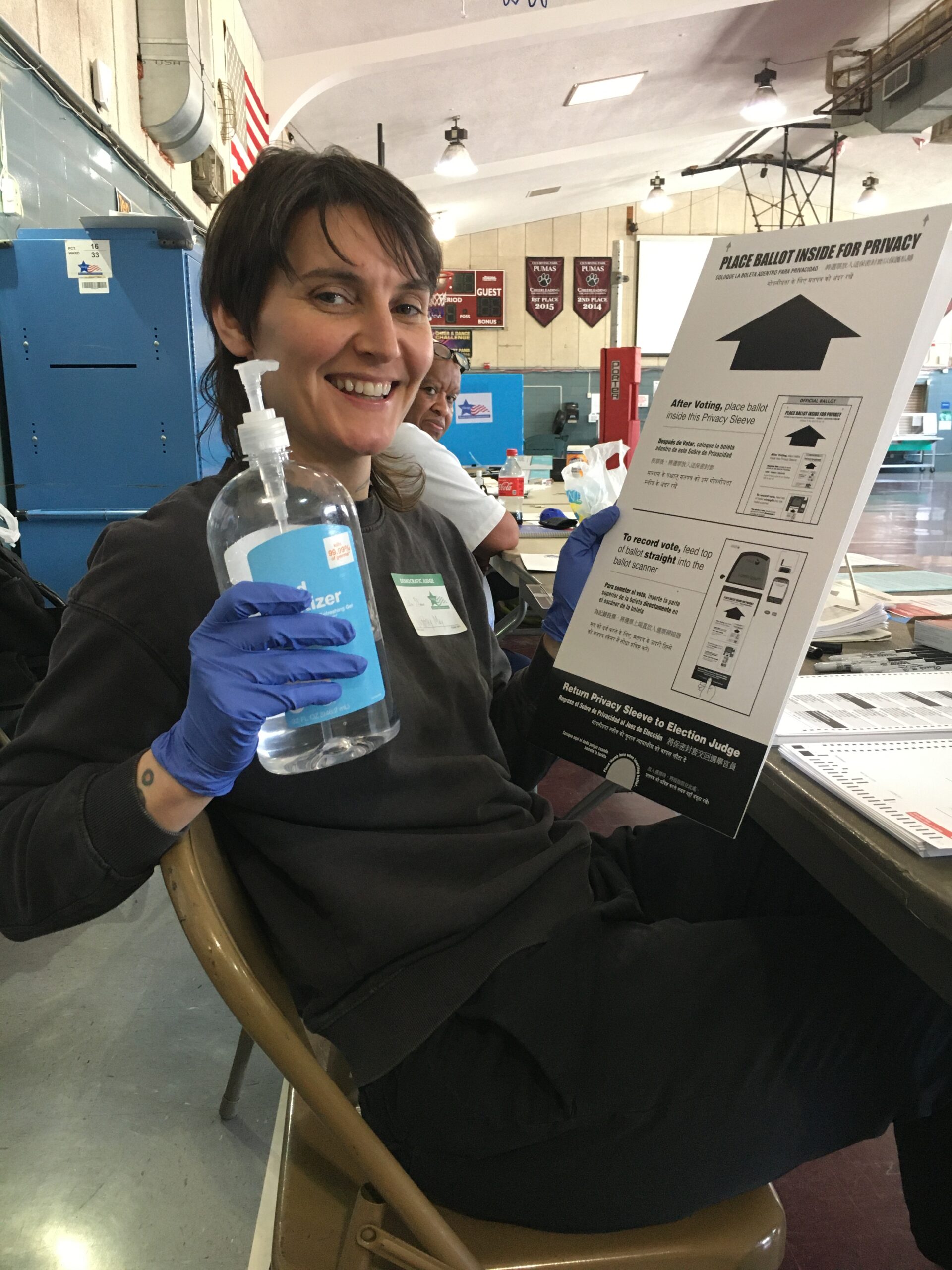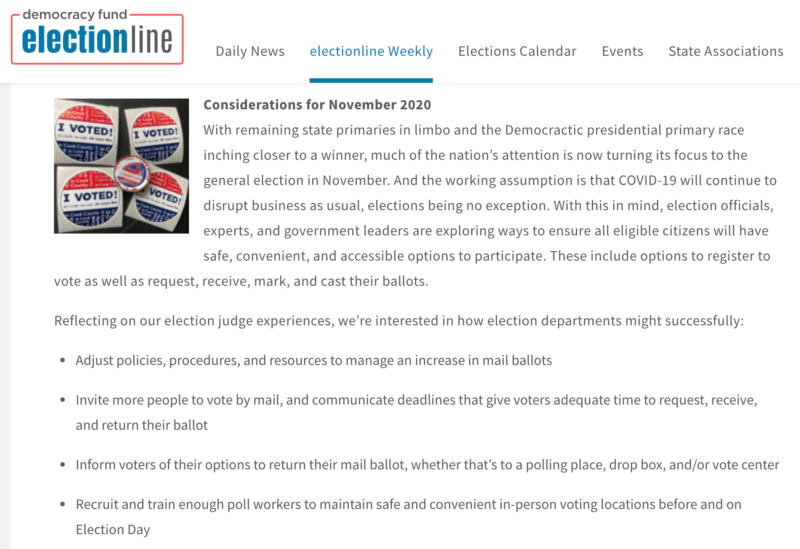2020 Vision: Reflections on Serving as Poll Workers During a Pandemic
One year ago it wasn’t clear if masks were an effective tool to slow the spread of COVID-19. We were faithfully washing our hands, using sanitizing wipes, wearing latex gloves, and applying hand sanitizer, but it wasn’t yet common practice for us to wear masks. Fast forward and now we’re wearing 2 at a time. Today we’re taking a moment to pause, look back, and consider what we’ve learned and how we’ve adapted to changes in the world over the last year.

On March 17, 2020 six CTCL staff members served as election judges for the 2020 Illinois Presidential Primary in Chicago and suburban Cook County. Our story about being poll workers during a pandemic was featured in electionline on March 26, 2020. We had a lot of questions before March 17th — Will the other election judges show up? How will we set up the space for social distancing? Will we have enough sanitizing wipes for the day?
In the days and weeks that followed the primary, we had even more questions about the November 2020 election — How might election offices adjust to manage an increase in mail ballots? How might they recruit and train enough poll workers to maintain safe and convenient in-person voting locations? And how might CTCL best support election offices as they administer a presidential election during a pandemic?

We knew then that our organization would provide best practices, tools, and training to help election offices navigate changes due to COVID-19. We’re proud of the COVID-19 webinar series that featured 24 expert guest speakers and covered topics ranging from ballot dropoff locations to virtually training election workers.
But what we didn’t know in March 2020 is that CTCL would lead a COVID-19 Response Grants program that provided approximately $350m of funding to nearly 2,500 U.S election offices to help them operationalize safe and secure elections.
To commemorate the date, we’re exploring how CTCL grantees addressed some of our initial questions that emerged after our election judge experience on March 17, 2020. Below you’ll find a series of quotes directly from election officials who received CTCL COVID-19 grants.
Election offices that adjusted policies, procedures, and resources to manage an increase in mail ballots
- “Your grant helped us purchase an additional tabulator for mailed in ballots. Boy! Am I glad we did!! Our volume was 4-5 TIMES the normal count. We would have still been tabulating the following day without it!”
- “We used our grant funding to assist in purchasing a high-speed tabulator, and corresponding software and printer, to count absentee ballots. By having this tabulator, we were able to process almost double the amount of absentee ballots in half the amount of time (compared with the August Primary election).”
- “Significant costs resulted from this surge of vote-by-mail activity, including increased printing and mailing costs, additional staff hours, mail processing equipment, and additional storage at our election supplies warehouse.”
- “In our 104 year old building we had a room built specifically for pre-processing.”
- “We were able to hire the necessary election support staff needed to manage the influx of mail-in ballots. The likelihood of mistakes being made is greatly reduced when there is adequate staff.”
Election offices that proactively invited more people to vote by mail and informed voters of their options to safely cast their ballot
- “We sent out robocalls, radio ads, and news paper ads informing voters when their ballot would be mailed, the election date, and information on current COVID restrictions and how to contact us if they needed assistance, and deadlines for returning their ballot.”
- “Without the grant, my office had no funding for voter education and outreach. With the grant funding, we created a simple but highly effective media campaign to drive voters to the official election websites. The websites provided crucial information in our vote-by-mail environment and newly implemented same-day voter registration.”
- “The City Clerk’s Office held drive-thru absentee ballot pick-up events for voters. We helped thousands of voters obtain their absentee ballots in-person, while safely remaining in their cars. This required overtime, hazard pay, signage, supplies, police support, and it was all paid for with CTCL grant money.”
- “We mailed a custom voter registration card to every registered voter in the City. As part of this mailing, information was included about our website, locations for early voting, drop box locations, and an invitation to a community drive-thru Trunk or Treat Halloween event that was held in our parking lot in which hundreds of families attended.”
- “We were able to procure drop boxes for more rural areas giving greater access to voting.”
- “We used a large portion of the grant funds to purchase a VoteMobile. This mobile voting unit went out daily for 3 weeks and was able to get to the people who had been displaced due to the fires along with all voters in the county.”
Election offices that recruited and trained enough poll workers to maintain safe and convenient in-person voting locations before and on Election Day
- “Our regular workers are generally elderly and most, wisely so, were unwilling to risk COVID-19 exposure at the polls. CTCL funds allowed us to to recruit and train enough new workers to have ample coverage at the polls for in-person voters and to process the overwhelming number of absentee ballots. The result was we created a pool of enthusiastic new workers excited to continue to work at future elections, which is awesome!”
- “We are a small rural Township and finding election workers for $10.00 per hour is difficult even during much better times. By offering hazard pay we could increase the amount paid to the workers who risked their own health to help ensure the success of the voting process.”
- “We were having a hard time getting judges as they were afraid of people coming in with COVID. The hazard pay made them feel like we really cared about them. They were so appreciative for the extra pay.”
- “We recruited dozens of HS students with language skills to help translate at the polling locations.”
- “With the Grant funds we were able to hire interpreters at each polling location to assist non-English speaking residents with questions on voting.”
These individual stories are part of a bigger, national narrative. One in particular that stands out are those offices that focused on recruiting young poll workers. In this National Public Radio story from August, we hear about the acute need and opportunity for young poll workers, including the experience of CTCL’s very own Rocío Hernandez, who served as a bilingual election judge in Cook County on March 17, 2020.
As we reflect on the last year — what we learned, our decisions, and the ways we’ve changed — it’s a remarkable example of how resilient humans are. And if we believe that elections are people-powered, it makes perfect sense that we also see that resiliency in U.S. election administration, too.
Election officials continue to make democracy happen for all of us in 2021 and CTCL continues to support them. Please stay tuned for more updates over the coming months on the CTCL COVID-19 Response grants program and other ways we’re responding to the needs of the field.